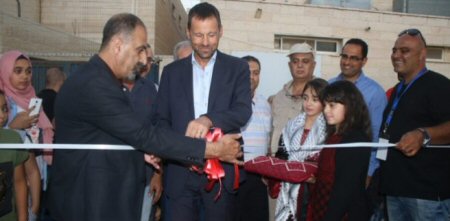For three days, the roofs of Bethlehem’s Dheisheh Refugee Camp is transformed. Bright lights are hung from every corner, and the roofs are filled with stalls where people from the camp sell popcorn, coffee, food, and knitted dolls. There’s a crowd of hundreds of people, lots of them children. Most are from the refugee camp – but, there are many from nearby villages, from Bethlehem, Jerusalem and further outside, in addition to internationals in the city. They have come to attend the “Al-Suha” Cultural festival, hosted by the Palestinian Vision and the EU, intended to promote Palestinian culture and strengthen ties with other cultures.
A stage at one end hosts a series of artists, lit up against the sunset behind them. The first night’s main event is the Shaykh Emam Al-Laila fans band, that plays songs and traditions that the audience echo back to them. On the second night Palestinian string quartet Palestrings play, before our attention is directed to a puppet theatre, and we are treated to a ten minute play instructing the young audience about environmental issues. On the third night Abu Muniar Salman and Ibrahim Abu Laban perform their songs to the crowd, who dance and sing along with them.
Naji Ouda, representative of the partner institutions of the festival, welcomed the audience, stressing that the festival is a small joy between the pain and suffering of the Palestinian people, and it is very beautiful and important to engrave joy and culture in the camp of Deheisheh and other Palestinian camps.
Osama Abu Arafeh of Palvision agreed: “People need more entertaining events,” he told me. “Now, they can explore new music and have fun. Through this festival, we are willing to explore the connection between different music.”
https://www.facebook.com/pnnnetwork/videos/446531689187119/
The first string quartet was Palestinian, he said, but with a Spanish cello player, Vicente Marin Diez. And now, playing as we spoke was a band that featured Irish artist Aiden Pentinople. “So, what we are trying to say here is there is a common global language which is music,” Arafeh said.
“And, it is a nice place, a nice event for people here to enjoy Eid.” The festival began on the last day of Eid al Adha, the Islamic “Festival of Sacrifice.”
EU Deputy Representative Thomas Nickelson said: “I think it’s a message that even in a place like this there is a drive, there is a thirst for culture. And, you see that there are a lot of people, a lot of children coming out, and culture is something that actually brings people together and helps people grow. We bring musicians from all over Europe, and we hope this will come out in the festival.”
The EU provides a lot of assistance to Palestinians, with the long-term objective of a two-state solution, he noted, “but, we cannot always, every day and every second, work on the final issues.
“So, we think it’s important to work on local initiatives, cultural events like this one.”
This was the first year the festival had been organised, Arafeh said. “Next week, we are organising one in Jerusalem, with a title that means “Visit Us”.
“We would be very happy to organise this festival again, here, next year. And, we will work towards achieving this.”
The “Al-Suha” festival is part of the Habaka project, which aims to encourage marginalized Palestinian communities to become more educated and to increase awareness of the EU’s contribution to the Palestinian cultural sector through a number of activities and activities. It is organised in Bethlehem and Gaza, as well as mobile cultural museums in the streets of Nablus, Hebron, Bethlehem, East Jerusalem and Gaza. Palestinian Vision will also launch street carnivals in these cities, over the coming months.
Human Interest 08/15/18 Gaza: Meet the Palestinian Doctor Who Watched His Son Die


